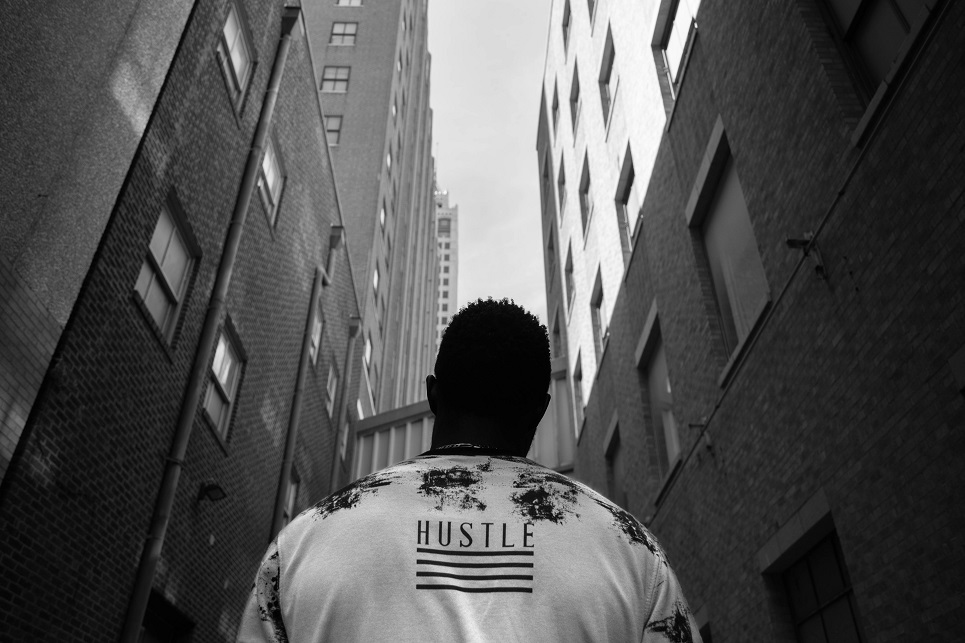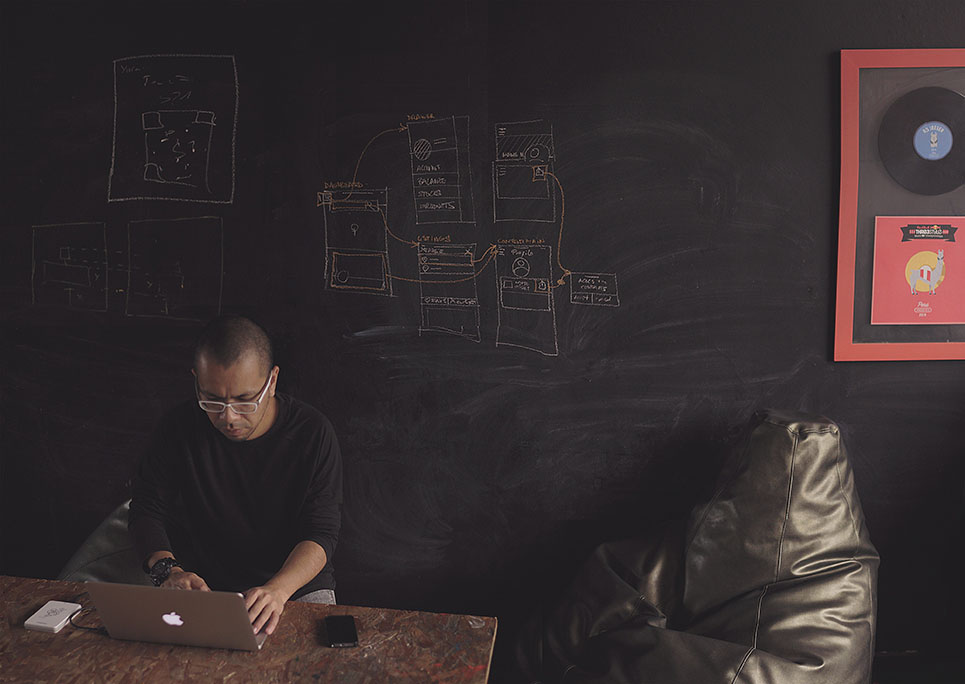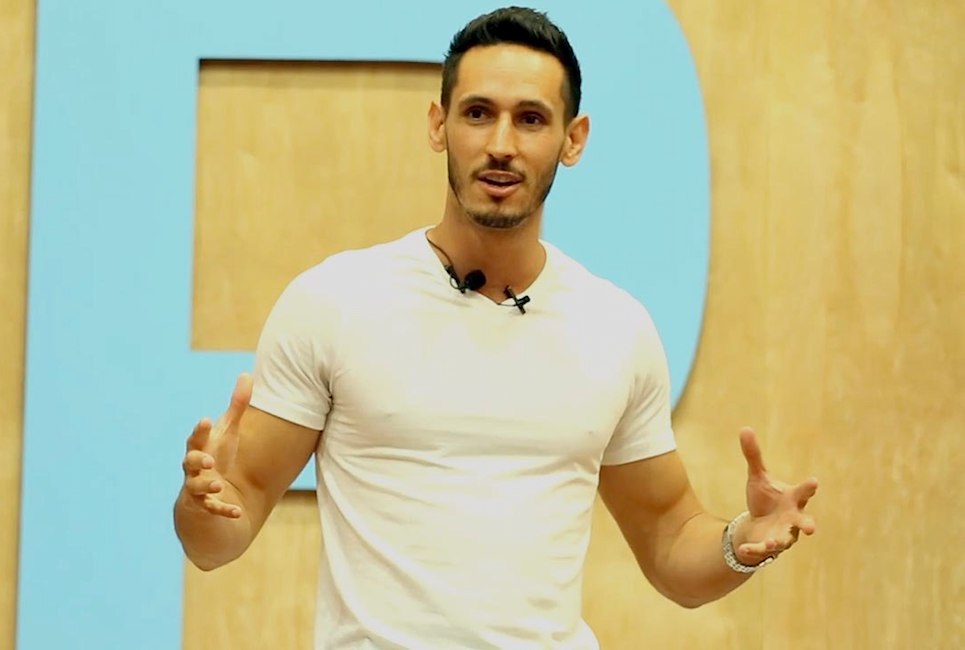As the Author Sue Grafton said, “Ideas are easy. It’s the execution of ideas that really separates the sheep from the goats.”
Continue reading5 Best Tips for Increasing Your Productivity That You Need to Know Now!
Productivity: a seemingly simple word that manages to both excite and terrify the entrepreneur within us.
Over the years, there have been plenty of self-help gurus and business owners that have come forward with their own ideas on how to boost productivity. However, some ideas are more harmful than helpful and a lot of people are unable to differentiate the good from the bad. Instead of wasting your time devouring self-help books and scouring the internet for productivity courses, take a look at 5 of the best tips for boosting your productivity below.
-
Use Technology to Your Advantage
In the productivity world, technology is often advertised as the bane of one’s existence. While technology does have the potential to prevent you from getting work done, it also has the potential to increase your productivity.
One article on Ecopreneur explores several of the apps currently on the market that can help you improve your productivity, including:
- Evernote: “Evernote manages everything from basic plaintext notes to rich text documents to images to entire web pages… Three of the handiest features are the ability to take a picture of a document with your device’s camera and store it as a note, which Evernote can then search within, the ability to record audio notes for either transcribing into text or for use as an audio recording, and the Shared Notebook feature, which allows you to collaborate with other members of your team. As a productivity app, Evernote is hard to beat.
- HootSuite: “This social media management system makes it simple and effective to post to multiple social networks, including Twitter, Facebook (both personal pages and company pages), LinkedIn, and Google+, and it allows for collaboration with other team members.”
- Carrot: “This somewhat aggressive to-do app helps motivate you to get stuff done by giving you feedback with an attitude. Carrot has a gesture-based interface, learns as you use it, and offers ‘rewards’ when you stay on track. This app, of all of those listed here, is probably the one most likely to be considered a productivity app exclusively, as it focuses solely on tasks and the completion of the tasks.”
Not every application will work for you, however. Make sure that you carefully research and test each app before you begin relying on it to boost your productivity.
-
Know Your Energy Schedule
Everyone has certain times throughout the day when they feel the most energized. For me, I feel the most energized in the mornings. At around 2:00 p.m., I begin to experience a lull that affects my productivity and prevents me from plowing through my tasks. Instead of fighting it and trying to accomplish one task for hours, I use this time to complete simple tasks that require minimal effort. The lull eventually wears off and I begin working on my important tasks again.
Figure out when you feel the most energized, focused, and motivated and schedule your important work around those times. For some people, this may not be possible. You may be a night owl who is currently working a 9-5 job. If this is the case for you and your energy isn’t highest during your working hours, find ways that you can boost your energy levels.
Some great ways to boost your energy include listening to motivational music, getting up and doing a brief exercise every 10 minutes or so, and drinking plenty of cold water. Only consider caffeine and supplements if you have tried alternative methods and they haven’t worked for you.
If you are a night owl, don’t let society’s normal schedule prevent you from doing work when you are capable of doing it best. An article in Foundr recently investigated the night owl lifestyle and provided several examples of famous night owls including Elon Musk, who goes to bed at 1:00 a.m. and wakes up at 7:00 a.m., Reddit founder Alexis Ohanian, who goes to bed at 2:00 a.m. and wakes up at around 10:00 a.m., and Moz founder Rand Fishkin, who goes to bed between 1:30 a.m. and 2:00 a.m. and wakes up between 9:00 a.m. and 9:30 a.m.
Related: Characteristics of a Social Entrepreneur
-
Rely on Others for Time-Consuming Tasks
Outsourcing is a blessing for many business owners. No matter what type of business you run, there are probably hundreds of tasks you do throughout the day that takes away from the time you need to complete major projects. Maybe you spend several hours a day marketing yourself and your product when you should be creating content for your product. Maybe you’re taking time out of your day to schedule appointments with clients instead of working with clients you already have.
Whatever it is that is preventing you from being truly productive, I can guarantee that there is someone or something out there that could be doing these tasks for you. The freelance market has experienced a dramatic change over the past few years and there is currently an abundance of professionals on the internet, waiting to take on work that business owners don’t have time for.
Although outsourcing has a stigma attached to it, there is a way that you can outsource your work while being socially conscious. Companies such as Samasource and Digital Divide Data take the work that you need to be done and outsource it to underdeveloped countries to provide those in need with employment.
The CEO of DDD, Michael Chertok, further explains this in an article in Huffington Post.
“Today, more than two dozen BPO (Business Process Outsourcing) firms in countries as diverse as Bangladesh, Ghana, Haiti, Kenya and Pakistan deliver services to clients performed by individuals from very disadvantaged backgrounds. In countries where the BPO industry is thriving, including India, the Philippines and the U.S.A., social entrepreneurs are bringing this model to small towns and villages in rural and remote areas to create employment and opportunity.”
-
Keep Your To-Do List Realistic
I can’t even begin to explain to you how many times I have packed my to-do list with nearly impossible tasks. If you know what I am talking about, then you understand the feeling that comes after you are unable to achieve everything that you set out to do. This daily feeling of “failure” leads you to believe that you are not capable of being a productive human being.
The problem, however, does not lie in your inability to tackle so many tasks at once. It lies in your inability to create a realistic to-do list. If you only have 8 hours to work and you’ve put over 10 large projects on your to-do list, you are setting yourself up for failure. Rather than going through this cycle, determine what you are able to do with the time that you have available.
Start by looking at your work and figuring out what needs to be done first. Organize your work in order of importance and start there. Once you’ve organized your work, schedule the most important tasks as soon as possible and place the items that you have time to do towards the end of your list or personal organizer. Take into consideration how much time you have to dedicate towards these projects and whether or not you will be able to finish each task on that given day.
Solène Pignet, CEO of Creators for Good, wrote a post on her blog a few years ago that explored the topic of social entrepreneurs and burnout. In it, she offered this helpful advice:
- Plan – how much you want to work on a weekly basis, and stick to that
- Schedule – your holidays and long weekends in advance. At least 6 times per year (yes! that often! You are not an employee; you need more rest than them to have enough energy!)
- Be strategic – about the impact you want to have, the milestones you need to reach, and the selective actions you are going to take. And then, stick to it! Stop working quantitatively, and have a qualitative approach instead.
If you remain honest and organized, your productivity levels will begin to soar.
Related: 7 Productivity Myths Busted: Are You Falling for Any of These?
-
Practice Self-Care When Needed
Sometimes, the best thing that you can do for yourself is to take a break and recharge. I know, it seems counterintuitive. However, think back to the last time that you attempted to do work when you were mentally exhausted or upset. Did you get any work done? If so, did you manage to produce the same quality of work that you would have if you were happy and well-rested? The answer to this is most likely no.
Jamie Green, a social entrepreneur who sells sleepwear and uses the proceeds to feed the homeless, creating homeless shelters, and generate employment, was recently featured in an article on Virgin where he commented on taking time to break away from his work:
“I spend 95 percent of my time behind a screen. If it’s not on my laptop creating pitch decks, answering emails and editing photos, it is spending time on my phone scrolling Instagram and reading the news – and to be honest it can take its toll on my mental health. I have different methods of dealing with this – I call them refocus days – and they might include going for a surf, cleaning the house or listening to a podcast while on a drive to get re-inspired.”
You can’t be productive if you have allowed your emotional, spiritual, mental, and physical health to suffer. If you need an entire day to recuperate, take a day off. If you only need a couple of hours, take a break from your work for a couple of hours. No matter how long it takes for you to recharge, you must take the time out of your day to do it or else your quality of work and your work output will continually suffer.
Do you need some ideas on how to practice self-care? Here are some suggestions that Forbes recommends for social entrepreneurs:
- Set aside time during your day to meditate
- Create a solid support system of people that you can go to when you feel overwhelmed with life and work
- Start a journal that helps you to recognize symptoms and triggers of burnout
Productivity seems to be elusive to so many people because they believe it is an art or a science rather than what it is: a deep understanding of the self. Knowing what drives you, when you feel driven, and what helps you to tackle the world is productivity in a nutshell. With these 5 tips, you will be better able to understand yourself and become more productive.
Want To Change the World? You Need to Read This First!
A lot of people want to change the world and make a difference. Perhaps you’re a recently graduated college student. You’ve had the opportunity to learn about many of the world’s problems and you want to do something about them. Problem is, you’ve got student loans payments, bills, and all the rest.
Or maybe you’re in the middle of your career, and you’ve been doing some volunteer work on the side. You love the causes you’re working on as a volunteer and to do it full-time, but you need to cash some checks as well.
Dreaming about a better future is easier than actually making it happen. So how can you become a social entrepreneur or a self-sustaining change creator? People who change the world don’t get up one morning and suddenly become a social enterprise leader. It takes step by step choices every day, a lot of heart, and tenacity to change the world and that starts with you!
What are some things you can do to make yourself a more effective change creator and increase the likelihood of success? Or maybe you’re already changing the world for the better. How can you maximize impact?
We field these questions and topics all the time. Often, the answers can be found in our magazine.
Today, we’re going to grab the bull by the horn and jump right in. Let’s talk about why creating change is important. And let’s talk about how you can get the ball rolling and start pursuing your social entrepreneurial ambitions. We’ll also share some tips and insights on how you can constantly improve your ambitions and business.
Along the way, we’re going to go over some high-minded concepts, and also examine some real-world examples. A lot of people have already changed the world for better, but just as a business can constantly improve, so too can the world. And you can be a part of the movement to build a better world and more sustainable future.
Why Should You Bother Creating Change At All?
What’s the meaning of life? Philosophers have been asking that question for millennia, and we’re not going to be able to answer it here. Perhaps there is no one answer. Or maybe the answer is different for each of us. But we can still ponder. From a biological point of view, the meaning of life is to reproduce and pass on your genetics.
A lot of us tend to embrace higher meanings, and that’s great. But when it comes to giving a sh**, basic biology remains relevant. That’s true even if basic biology doesn’t yield all the answers. What we do today will echo throughout our lifetimes and beyond. Those of us living in the present are custodians of the future.
Change Your Mind. Change the Future. How to Approach our Resources.
When we consume non-renewable resources in the present, we deprive those resources of future generations. Forget about oil, gasoline, and the other non-renewable resources that often come to mind. Think about the many reefs around the world that are dying and can never be replaced. Think about our forests or parks. Or think about it in human terms. Every child who dies from a preventable disease is a squandered resource. That child might have gone on to do extraordinary things. Become a doctor, a fantastic parent, or a life-changing teacher. Or anyone else who could have contributed to society. People like you are tired of the status quo and are ready to do something about it!
Related: Why Social Entrepreneurship is Picking Up Steam
Dream of a Better Future, Then Make It Happen
People love to dream about the future, spending as much as one hour of every eight thinking about it. Many of the dreamers that fill the pages of Change Creator have spent even more time pondering what could be. Many other social entrepreneurs also like to spend time with their head “in the clouds.” The future makes for a potent driving force. That’s true for both for our personal ambitions, and the potential to make an impact on the world.
There are countless different ways you can make a difference, and put giving a sh** into action. You could change your personal habits, consuming less, recycling more, and embracing a sustainable lifestyle. You could donate to charities and volunteer in your free time. Or you could become a social entrepreneur, putting the market to work. You can produce a profit for yourself and your company while also building a better future. That might mean developing sustainable technologies and alternatives. Or using technology to provide education to those who otherwise lack access. There are many ways to pursue positive change.
Business Can Be a Force For Building a Better Future
Change Creator is a business, we don’t deny it. We care about business measurables, including advertising revenues, readership, subscriptions, and all the rest. We must care about those things so that we can make a difference. Without money and readership, the lights go out and the mission dies.
The mission to make an impact by inspiring more social entrepreneurs to shape a better future is what drives us day-to-day. If we cared only about revenues and all that, we would have chosen a more profitable topic. But there are already tons of “money first” publications out there. Of course, money can and must be made in the social entrepreneur space.
Many of the entrepreneurs we’ve interviewed have built successful, even thriving companies. Still, if you want to be a true “Change Creator“, you have to think beyond dollars and cents. You need a driving motivation to make the world a better place and to preserve what we have for the future.
We are all driven by different things. Our Founder, Adam Force, is passionate about finding solutions to the world’s most pressing problems. He’s also passionate about empowering others so that they can find solutions. If Change Creator can inspire even one person to go out and make a big difference, it’ll all be worth it. But we’re aiming much bigger and our vision is to inspire one million Change Creators.
Millennials Find Their Passion First. Then Make Money and a Difference.
Or how about Yvon Chouinard, the founder of Patagonia. We’ll dive into his story later, but early on he was faced with a choice. Short-term profits, or sustainability. Chouinard is passionate about outdoor activities. He also has a deep respect for nature and sustainability. When founding Patagonia 1973, Chouinard focused on producing gear that was environmentally friendly. Now, Chouinard is a billionaire, and his company is one of the most respected and sustainable businesses around. It also generates hundreds of millions of dollars in revenues each year. Chouinard himself is also one of the most respected and lauded people on Earth.
Now, Chouinard is a billionaire, and his company is one of the most respected and sustainable businesses around. It also generates hundreds of millions of dollars in revenues each year. Chouinard himself is also one of the most respected and lauded people on Earth.
Titans of industry come and go, yet their names are often forgotten in the annals of history. Do you remember who was the shipping giant in 15th century Venice? We don’t. Wealth and power are fleeting, but striving to make the world a better place? That’s something that history remembers. We remember the Mart Luther Kings, Gandhis, Benjamin Franklins, and all the rest. Even yesteryear’s titans of industries, such as Carnegie Mellon, are now remembered more for their philanthropy than their businesses.
Change Creator is Serious About Creating Change to the Status Quo
We’re not talkers. We’re doers. Our magazine is very much about making a difference.
Contributing to the world is something that Change Creator takes seriously. Words can inspire action and impact.
The printing press ushered in the age of enlightenment, allowing for the diffusion of ideas and spurring intellectual debate. More recently, the Internet has given birth to the modern “Knowledge Economy”, shrinking the world. Now, researchers and thinkers from around the world can share their ideas and insights instantaneously.
For Change Creator, we want to support social entrepreneurs, do-gooders, and thought leaders who give a sh**. We want to inspire people to become social entrepreneurs as well. That can mean a lot of different things. Readers will see that in the diversity of our stories and the accomplishment of various social entrepreneurs.
When it comes to making a difference, there’s no one-size fits all approach. You have to figure out what’s most important for you, and what you can do to make a difference. What motivates to you as well. Just remember, we’ve only got one world so we’d better take care of it. We have to think not only of ourselves but those who have yet to come. We can’t offer you a simple blueprint to follow for creating change. However, we can share some lessons that we’ve learned along the way.
Related: 5 Ways to Stay Highly Productive and On Top Of Your Game
Get Sh** Done: Putting Talk Into Action
Talk is great, but without action, you won’t be making much of a difference. It’s the same with writing. At Change Creator, we don’t want to ink the prettiest words, we want to craft content that drives people to action. We want to inspire people, quite simply, to get sh** done.
Dreams and ambitions are beautiful, but without action they are meaningless. At some point, you have to stop dreaming and starting doing.
How you should get started depends on what you want to achieve. You need to educate yourself in the industry, community, and area you want to work. Education means more than reading (though reading is great!). Gain experience.
If you want to sell more sustainable fruits and vegetables, start a garden or go work on a farm. Work at grocery stories as well, and study how companies sell food. You can’t gain experience in every area, but the more experience and education you have, the better. Pursue your ideas. You might not have the funds to start up a grocery store right away or to establish a big farm. However, you may be able to grow vegetables on the land you have. You can sell your products at the nearby farmer’s markets, or by setting up a stand. Many great entrepreneurs come from humble beginnings.
You (Probably) Can’t Go It Alone
Share your ideas, try to find people who can help you in your efforts. Lone individuals often don’t accomplish very much. Humans are social creatures. It’s through organizations, society, and combined effort that most great things are accomplished. Steve Jobs had Joanna Hoffman, Steve Wozniak, and others.
These days, Bill Gates is known for his philanthropy. Can you name the wealth manager who helped Gates become one of the richest people in the world? His name is Michael Larson, and he’s regarded by many as being one of the best investors on the planet. Point is, both business and creating change are team efforts more often than not. As you strive to establish your business and make an impact in the community, you need to identify and reach out to potential team members.
Persist and then Persist Again
Creating change, building a business or movement, and establishing yourself as a leader won’t be easy. And chances are, you’re not going to be an immediate, smashing success. Quite likely, you’ll suffer some setbacks and failures along the way. Those failures might be personal. You might lose track of friends and family, or come to blows with business partners. Your failures might be abject.
Your first social enterprise could fall flat because you didn’t understand the market, the community, or another factor. Doesn’t matter. Persist and then persist again. People like to dream, and along the way, many people come to believe that their business will be a smashing success the day they launch it. You have a great idea, right? The world’s going to see that immediately, right?
As Dale Partridge, founder of StartUpCamp and millennial superhero says when entrepreneurs first start their company:
“People think it’s the Super Bowl. It’s really the first game of the season.”
You might have a smashing idea, but it’s not likely to be a smashing success, at least not right away. Persistence may be the biggest difference between would-be change creators who fizzle out, and those who go on to change the world. Try and try again. Failures don’t have to be losses. They can be learning experiences that inform your future efforts and ambitions.
If you’re serious about accomplishing anything, consistency is likely going to be the key. That’s why it’s important to find something you’re passionate about.
Whatever you’re trying to accomplish, you’re going to have to do it again, and again, and again. If you want to build a sustainable mountain climbing gear company or a thoughtful publication, you’re going to have to wake up day after day, making gear, writing and editing articles, whatever.
The Social Entrepreneur’s “Secret” Weapon: The Market
In the past, “do-gooders” and business-minded folks often lived in two different worlds. The business-minded folks would build a company, produce a lot of money, and then become rich. Along the way, some of them would give their money to charities and other do-gooders. Or some business folks would go ahead and start their own charity. Still, their business efforts and charitable endeavors were often distinct and separate.
Bill Gates is a great example of this. First, he built his company, Microsoft. Over time, he acquired billions of dollars. Then started his own charity, the Melinda and Bill Gates Foundation. Gates isn’t overly active in the business world these days. He was relinquished many of his duties at Microsoft. Meanwhile, his wealth is managed by professional investors.
However, Gates is actively pursuing various charitable endeavors, including global public health and education reform. Mr. Gates should be applauded and lauded for his efforts. However, “social entrepreneurs” are pursuing ambitions and changes that could produce even bigger changes in the long run. Social entrepreneurs seek to combine market forces with the “kind heart” of do-gooders.
It’s Good to Produce Profit and Change — At the Same Time.
A social entrepreneur wants to change the world and produce a profit at the same time. The secret to a social entrepreneur isn’t the profits themselves. Instead, it’s the power of markets and their ability to allocate resources. The market has proven to be the most efficient resource allocation system known to man. Perhaps a bit ironically, the power of the market is derived as much from its failures as its successes. Markets allow bad businesses and ideas to fail. Markets also allow great ideas to succeed and reward such ideas with more money and resources.
There are many great, efficient charities that allocate resources effectively and efficiently. These charities operate in a quasi-market where donors will often choose the most effective and efficient charities to donate to. However, this market isn’t as efficient and effective as the private sector where the ability to make profits determines whether a company will sink or swim. Social entrepreneurs compete in the private market. Either their ideas will succeed and they will produce profits, or they will go out of business. This means that effective, efficient, and well-managed companies with good ideas will succeed. Inefficient companies will go the way of the dinosaur and go out of business.
Staying True to Your Community
One of the challenges many social entrepreneurs face is creating positive change. The market is great for allocating resources to successful, profitable business ideas. However, the market can’t necessarily ensure that ideas and businesses do good. That’s up to you as a social entrepreneur. Are you willing to set aside short-term profits for the sake of grander, more holistic goals?
Remember Chouinard, the founder of Patagonia? Before founding his company, Chouinard was faced with a difficult choice: he could have pursued short-term profits, continuing to manufacture high-quality steel pitons, but doing so was going to damage the environment. After more than a decade of success, Chouinard came to find that the steel pitons that provided the bulk of his income were also damaging Yosemite’s rock faces. It turned out that the steel pitons he was making, were damaging the natural wonders in Yosemite and elsewhere.
Chouinard could have just kept his head low, continuing to sell his pitons. He would have made money, he would have paid his bills and supported his lifestyle, even if it damaged the environment. But Chouinard decided to stay true to his community. The environment is a precious resource, and the old way of doing business would have destroyed rock faces, ruining them for future generations. He chose instead to embrace “clean climbing” and sustainability, seeing it not as a hindrance, but a way to distinguish his company in the marketplace and to offer competitive advantages. Patagonia was born, and his new company wasn’t going to simply sell climbing equipment and outdoor gear.
Chouinard incorporated sustainability into his business model, making it a part of his company’s DNA. Producing profits wasn’t enough. Patagonia would produce profits while also acting as a custodian for the environment. His company grew, and now produces hundreds of millions of dollars per year in revenues.
Measure. Learn. Adjust. Repeat.
When it comes to being a social entrepreneur, it’s not just about profits. You already know that, and that’s why you’re reading this article. High-minded goals like saving the world and ending the poverty are great. Embrace them. Let them drive you. But you need smaller, more measurable goals as well.
Consider Change Creator. We worry about advertising and subscription like any other publication. Publications also worry about readership. How much time are people spending on an article, website or app? Are they reading the entire article? Are they acting on what they are reading by signing up for a newsletter, paying for a subscription, or sharing on social media? We obsess over these statistics because it helps us measure how many people we are reaching.
For Change Creator, we want our audience to be as large as possible, and it’s not just about the bottom line, it’s about expanding our reach and inspiring as many people as possible.
How can you measure your impact? How can you track how many lives you’re impacting?
Data is important because it informs you and allows you to measure your success. Intricate data, such as how long a person spends reading an article, provide a lot more insight than a simple bottom-line analysis. Even if your company is profitable, are you really maximizing success? Your data can help you find out. You can discover what’s working and what’s under-performing.
For example, we can crunch data to find out what articles people are reading and what topics are performing well. We can also see what topics aren’t gaining traction. Then we can adjust our publishing calendar to key in on the topics that are performing well. This should yield even more success.
What data you collect is going to depend on your business and your goals. When it comes to social entrepreneurship it’s important to remember your community and your altruistic aims. Many companies lose sight of their “do-good” ambitions by failing to keep track of their in-community impact. Don’t lose track, and don’t let profits become your sole focus. Always remember that you have higher ambitions. Make sure that those ambitions are coded into your company’s DNA. Blast them on your “About Us” page, codify them into your official company values, and track them with data, constantly and incessantly.
It’s Time To Get To Work
You know what? Enough talk. We could go on about this forever. It’s our passion. But the first step to creating positive change is to put ideas, dreams, and ambitions into action. So get to work. Pursue your dreams. Make the world a better place. We’re going to be right there with you trying to create a better present, and building towards a better future. We hope you’ll join us on our wild ride.
13 Traits That All Effective Social Entrepreneurs (And Conscious People) Share
What exactly is a social entrepreneur?
According to Investopedia, a social entrepreneur is “a person who pursues an innovative idea with the potential to solve a community problem.”
Take, for example, Muhammad Yunus. Yunus founded his own bank in Bangladesh that allowed those living in poverty to borrow money without having to pay collateral. His ultimate goal in creating this bank was to reduce poverty levels in the area and it was and continues to be quite successful.
To this date, the Grameen Bank has had an extraordinary impact on poverty throughout Bangladesh by doing something as simple as providing banking services to those who would normally be turned away.
Now that we know exactly what a social entrepreneur is and what they set out to do, the next question we need to ask is, what makes a social entrepreneur effective enough to make a large impact? What made Yunus so successful?
If you are struggling with your own business, what differentiates you from some of the successful social entrepreneurs of today?
It all comes down to a handful of powerful personality traits.
If you want to join the ranks of the effective social entrepreneurs, study and incorporate these 13 traits into your personality:
-
Effective Social Entrepreneurs Are… Authentic
Social entrepreneurs are dedicated to their cause and wholly believe that it is their responsibility to do what they can to alleviate social issues such as poverty and the lack of access to education in certain countries. Those who are not invested in a cause and are only interested in making a profit are destined for failure. Effective social entrepreneurs are authentic and seek change, not a paycheck.
How can you avoid becoming a social entrepreneur that is only in the business of change for profit? Make sure that you are truly invested in your cause. Imagine that you have traveled five years in the future and are currently working to support your cause. Have you grown bored with your work? Are you excited about the type of money that you are making? Do you measure your success in checks rather than changes? If you’ve answered yes to any of the above, chances are that you not dedicated to your cause and will not be effective in your efforts.
-
Effective Social Entrepreneurs Are… Prepared
Social entrepreneurs, although goal oriented, know what it takes to run a successful business. Before they launch their business, they’ve constructed an ironclad plan that will ensure the longevity and impact of their business. They’ve done their homework and they are prepared for any obstacles that may come their way while they are running their business. The most successful of social entrepreneurs are prepared for the business side of their goals.
You may or may not have heard of Blake Mycoskie but you have most certainly heard of his company TOMS. TOMS is a company that produces shoes, clothing, and accessories for men and women. For every shoe or product bought, the company gives away water, shoes, and other types of materials and services to those who are in need. TOMS was and continues to be very successful in its efforts.
This success can mostly be attributed to Mycoskie’s entrepreneurial background. Prior to founding TOMS, Mycoskie successfully founded and ran five different businesses. His experience goes as far back as 1996 when he founded a laundry service for Southern Methodist University called EZ Laundry. Until the creation of TOMS, he also founded a billboard company, a cable network, an online driver’s education service, and a marketing firm.
Without this essential business experience, who knows where Blake Mycoskie’s company TOMS would be today.
-
Effective Social Entrepreneurs Are… Collaborative
No business functions well if a single person is attempting to control it or do all the work necessary to keep it running. Social entrepreneurs are well aware of this truth and have a large team by their side to help them achieve their goals and fight for their cause. They allow people to help them out and welcome ideas presented by others who share similar philosophies and values. An effective social entrepreneur knows to collaborate with others rather than trying to take on the world by themselves.
Need some networking tips that will help you become more collaborative? Take a look at some of the ideas below.
- Reach out to people who have a large audience and who are dedicated to your cause.
- Seek out family, friends, and acquaintances. These people will be your greatest assets during your entrepreneurial journey and may just have the skill sets that you require to steer your organization in the right direction.
- Judge someone by their talent, not their status. While someone may have had 10 years of experience at a tech company and founded their own organization, it does not mean that they will always be the right fit for your cause. You may end up with someone who is uneducated but who has the skills you need to be successful.
- Be kind and generous. Networking will not work for you if you are someone who consistently takes in relationships or who never reaches out for the sake of it.
- Go to places where you might expect to meet someone who will be interested in your cause.
-
Effective Social Entrepreneurs Are… Flexible
Like Jimmy Dean once said, “I can’t change the direction of the wind, but I can adjust my sails to always reach my destination.” Things around us are constantly changing and social entrepreneurs understand that they need to change their ideas and their businesses to better equip themselves to deal with the problems they are targeting. Effective social entrepreneurs are flexible, adaptable, and know that they must change things constantly to be successful.
Flexibility is exactly how Lucky Iron Fish, a social enterprise dedicated to eliminating iron deficiency, managed to prevent their business from failing despite facing overwhelming odds.
Lucky Iron Fish appeared to have everything they needed to be successful. They had developed a product that was efficient and aesthetically pleasing, they had more than enough funding to launch the product, and they had created a sales team that would go door-to-door throughout Cambodia to sell their product.
The results, however, were anything but promising. The organization had failed to gain the trust and the interest of the community and they overlooked the fact that the Cambodian government had already been giving out free iron supplements. Instead of continuing to sell the product according to their original plan or giving up entirely, Lucky Iron Fish changed their course and began working with other organizations who were already operating throughout Cambodia in order to become trustworthy to the people and make their product more appealing.
Related: How to find ideas for your social enterprise that you’ll want to pursue
Now, Lucky Iron Fish has been recognized by individuals such as Oprah and is selling around the world. What can we learn from this? Well, as the CEO of Lucky Iron Fish once said,
“We failed a lot and had to quickly adapt.”
-
Effective Social Entrepreneurs Are… Daring
Social issues are generally brought about because society has been traveling in one course that has resulted in the issue itself. Because of this, a social entrepreneur has to be willing to go against the grain of society in order to solve the problem that is plaguing society. Social entrepreneurs that are truly dedicated to their cause understand that it takes a revolution and a little bit of rebellion to solve a problem that has been deeply ingrained into our beliefs and behavior.
Don’t be afraid to cross a few lines or do something new to achieve your goals. This does not mean that you need to break several laws or do something unethical in order to make a difference in the world but it does mean that you have to have the courage needed to challenge the status quo and push a few buttons in the process.
-
Effective Social Entrepreneurs Are… Creative
Although this may seem like an obvious personality trait, social entrepreneurs are creative in more ways than one. They are constantly providing unique solutions to some of society’s biggest issues, changing the way that businesses are run, and coming up with additional ways to impact the world around them. Using creativity to achieve these types of goals is what makes a social entrepreneur effective.
One company that comes to mind when I think about the word creative is soleRebels. soleRebels is a company in Ethiopia that handcrafts sustainable footwear using materials such as organic cotton and recycled tires. The way that the company produces their shoes also helps to reduce carbon emissions.
Along with their mission to recycle and reduce our carbon footprint, the company also provides jobs locally to improve the economy and to help those who aren’t able to support themselves otherwise. soleRebels solves not one, not two, but three different problems that are currently plaguing our society. This creativity is what sets them apart from other social entrepreneurs and makes them extremely effective at what they are trying to accomplish.
-
Effective Social Entrepreneurs Are… Passionate
A social entrepreneur usually chooses to become a social entrepreneur because they themselves or someone that they know has been a victim as a result of a social issue. Whether they have previously led a life of extreme poverty or have experienced violence within their culture, they are passionate about their cause and are dedicated to making a change in regards to their cause.
One such notable social entrepreneur who experienced a social issue firsthand and was passionate enough to make a difference is Shiza Shahid. Shahid is the driving force behind the Malala Fund, which is an organization dedicated to providing education to women in countries where it has been outlawed or isn’t provided.
Shahid was raised in the capital city of Pakistan, Islamabad, and was devoting her time to help others from a young age. She was lucky enough to receive a scholarship to Stanford University and was able to receive a quality education. She noticed, however, that other women and girls in her country were not as lucky.
That was when Malala Yousafzai started receiving recognition for her effort to draw attention towards the lack of education in her country. Shahid, inspired, reached out to Malala and organized a camp that would give her the inspiration needed to become an activist and entrepreneur. A couple of years after Shahid organized the camp, Malala was shot by the Taliban.
Shahid once again rushed to her aid and because of the event and Malala’s recovery, Malala’s family and Shahid were inspired to create an organization that would address the lack of education for women. Malala decided that Shahid was the person for the project and Shahid took the helm, despite not initially believing in herself.
This type of passion is what made Shahid an effective social entrepreneur. She experienced an injustice that caused her to take action, persevered through the challenges of running an organization so that she could make a difference, and came out successful.
-
Effective Social Entrepreneurs Are… Charismatic
Social Entrepreneurs have a magnetic personality and a way with words that could convince you to join almost any cause that they had. This works in their favor because they are able to create of network of people united towards a common goal that will inevitably carry them to victory. A good social entrepreneur is charismatic and knows how to network with individuals that will prove to be valuable resources down the road.
Being charismatic isn’t as complicated as the masses make it seem. All that is required to be charismatic is passion and conviction. BELIEVE in what you are trying to achieve. KNOW that what you believe is an absolute truth. CONVINCE others that what you are trying to accomplish is possible and that you need their help in order to achieve it.
Believe in yourself and in your cause and your charisma will shine through.
-
Effective Social Entrepreneurs Are… Persistent
A non-negotiable goal and an iron will are necessary if you ever plan on being a social entrepreneur. If you have any doubt in your goal or if you give up easily in the face of conflict, you will never be able to create the change that you are seeking. You must be ready and willing to do anything necessary in order to achieve your goal. Persistence is one of the key traits that all effective social entrepreneurs share.
Many of the world’s most famous social entrepreneurs have faced failure and came out on top, including Arianna Huffington. In fact, according to her,
“I failed, many times in my life. One failure that I always remember was when my second book was rejected by 36 publishers… But my mother used to tell me, ‘failure is not the opposite of success, it’s a stepping stone to success.’ So at some point, I learned not to dread failure.”
Arianna went on to create Huffington Post, become one of Time Magazine’s Top 100 most influential women, and recently launched a new company known as Thrive Global. Without this kind of persistence, Arianna wouldn’t have become the effective Social Entrepreneur that she is today.
-
Effective Social Entrepreneurs Are… Energetic
Social issues do not have days off. Poverty or starvation does not disappear or momentarily cease simply because it does not feel like functioning one day and neither do social entrepreneurs. Social entrepreneurs are highly energetic and can always be found working, generating new ideas and solutions, and motivating and inspiring others to work towards their cause. Laziness or temporary lapses in motivation have no room in a social entrepreneur’s schedule.
-
Effective Social Entrepreneurs Are… Intelligent
Individuals who are determined to create change are highly intelligent. They are knowledgeable about their cause, they are well-versed in business, and they are clever enough to generate the funds and gather the following needed to keep their business running smoothly. They are constantly seeking new knowledge and embrace learning. Intelligence is necessary if you are striving to be an effective social entrepreneur.
Some great places to begin learning about business and socal enterprise include:
- Change Creator Magazine (of course!)
- Forbes
- Ashoka
- Acumen
- Skoll Foundation
- Unreasonable
- Social Enterprise Alliance
Begin to invest your time in learning these subjects and you will have a much easier time setting up and launching a successful social enterprise. Turn away knowledge and you may end up with a failing social enterprise instead.
-
Effective Social Entrepreneurs Are… Humble
Social entrepreneurship has no room for the ego. The business of making a change in society has nothing to do with the person who is running the business. A social entrepreneur doesn’t make an effort to bring attention to them or make themselves seem important. They focus on the problem their business was designed to remedy and they do it to the best of ability, with or without recognition.
A great example of a humble social entrepreneur is the founder of Citizen Effect, Dan Morrison. Citizen Effect is a non-profit organization that was created to help fund small-scale philanthropic projects that provided people and places with things such as clean energy, food donations, and clean water.
The organization received $300,000 in funding in 2009, which Morrison planned to use to advance the company and receive even more funding. However, this never happened. Morrison, rather than acknowledging his talents and picking a role in the organization that was suitable for him, he decided that he was the CEO of the Citizen Effect.
Because of his ego, the organization did not grow and the funding that they received was wasted. On an article in The Guardian, this is what Morrison had to say about the situation:
“What should have happened? My funders and board should have sat me down, muzzled my ego and said: “Dan, you are going to be the founder and chief innovation officer and report to the new CEO we are now conducting a search to find… At the end of the day, it is not my board’s fault but mine for not being honest with myself. If I had been, there’s a high probability that a real CEO would have paused tech development, taken the data from our pilot along with the credibility that TomorrowVentures’ investment gave us, and hit the road to raise the capital we needed to assemble a powerhouse team and build a human and technology platform that would have changed the lives of millions for the better.”
He goes on to wrap up the article with a powerful statement that you will hopefully never have to utter to yourself:
“Lesson learned.”
-
Effective Social Entrepreneurs Are… Confident
Confidence is key in business. If you are not loud, proud, and absolutely sure of your business, you are not likely to attract the attention or the funding that you will need to support your cause. An effective social entrepreneur is sure of both their ability to make a difference in the world and their ability to create a business that will provide the solutions to make that difference.
You can start becoming more confident in how you conduct business with others by doing things such as dressing for success, replacing negative self-talk with positive thoughts, reminding yourself of your accomplishments insofar, knowing what you want and going after it, and eliminating self-doubt. Once you’ve proven to yourself that you can conduct business effectively and confidently, it will be easier for you in the future.
Social entrepreneurship is about heart, dedication, and passion but also about trying to make money. To become someone who makes a difference, all you have to do is care enough to take action. Once you’ve found that desire, everything else will fall into place.
Related:
5 Powerful Truths from the Survive and Thrive Conference!
Team Change Creator represented at the Survive and Thrive conference and came back with real treasure. Here’s a small taste of some key lessons.
Continue readingHow to Find a Travel Experience and Give Back (Wouldn’t That Be Great?)
There are two types of people in this world – those who travel and those who don’t. Traveling enriches our lives and transforms our personalities.
Continue reading5 Ways to Improve Your Impact as a Social Entrepreneur
As a social entrepreneur, you are the one out there tackling social issues with your sustainable business. But, you know what? You are not a superhero. If you want to increase your impact, there are some basic things that you need to do. Here are five ways to improve your impact as a social entrepreneur:
1. Don’t try to do everything yourself.
There are so many social issues to be covered around the world; Poverty, Global Warming, Energy consumption, the environmental conservation, refugee crisis, population growth, Economic Development, Health, etc. What you can do is limited, and you can’t solve every single issue alone. That’s the dilemma. But don’t worry. It’s ok.
Collaboration is an essential key to be a successful social entrepreneur. You know why? Because what you want to achieve is to solve problems that you found one by one, not to show off who you are. It is always a good idea to partner with those who are already doing the work in the field because they must have more experience and knowledge about the affairs. It doesn’t mean they have everything they need. You might be able to fill in the gaps or pieces that are missing.
When collaboration brings energy to millions.
d.light is a global solar energy company that delivers affordable solar-powered solutions designed for the 2 billion people living without access to reliable energy in Africa, China, South Asia and the United States.
d.light started a channel partnership with Unilever. How it worked was that d.light sells solar home systems to Unilever, which places them in the small-scale retail shops that stock its products, so all parties: Unilever, d.light, and the retailers financially benefit, which all profit from increased sales.
While having access to solar lighting led to significant increases in store revenue, d.light also benefits from increased awareness of its products among consumers who shop at retailers’ stores because of the way that the light impacts the aesthetic of the shops.
Remember, “why” you do your business is more important than “how” you do it. You’d better ask yourself the purpose of the path.
2. Don’t try to be a hero in one night.
Social entrepreneurs are not superheroes (But they are force to be reckon with). You should keep it in your mind that you cannot be a hero in one night as Rome wasn’t built in a day.
Let’s focus on one small issue that you can solve as a start, then gradually pace up. Simplicity is a key to unwind complexity in the end. Microfinance is a well-known concept today, but did Muhammad Yunus see he could change the world in a blink? No.
He wanted to save a poor person right in front of him on the street one day, started a new way of lending money to the poor in a city where he lived, opened Grameen Bank there, the system expanded in Bangladesh and now around the world. One by one from a small but impactful thing.
3. Never stop listening.
Listening is so important as a social entrepreneur.
Some people think that they already have a solution to an issue, without really listening to the people they are serving. For example, when Gavin Armstrong — featured in our special Top 10 Edition — founded the company Lucky Iron Fish, a company that created an iron fish to help people around the world deal with anemia and iron deficiencies. When he began to launch his product, an iron fish, he talked to the women in Cambodia who would be using this product, cooking for their families. He listened to the local Cambodians on how he should brand and name his company. He didn’t do it alone or think he had all the answers.
Listen to your customers. This is the only way to find out what they want.
I’ll give you an example through my experience with a crowdfunding campaign called Musana Carts: The Solar Street Vending Revolution. My friends and I came up with an idea to provide food carts with market vendors in Uganda 2 years ago. We thought the carts would make it easier for vendors to move around with wheels of the carts.
However, the reality was that it wasn’t useful because vendors needed to stay in their spot that the government authorized for well management reason. So we suggested pushing carts between their houses and the market. It didn’t work either because it might create traffic accident such as vendors hit by a car. Every single idea is worth coming up with, but you should never skip the phrase “listen to your (potential) customers,” so you can sell them what they want and give them what they need.
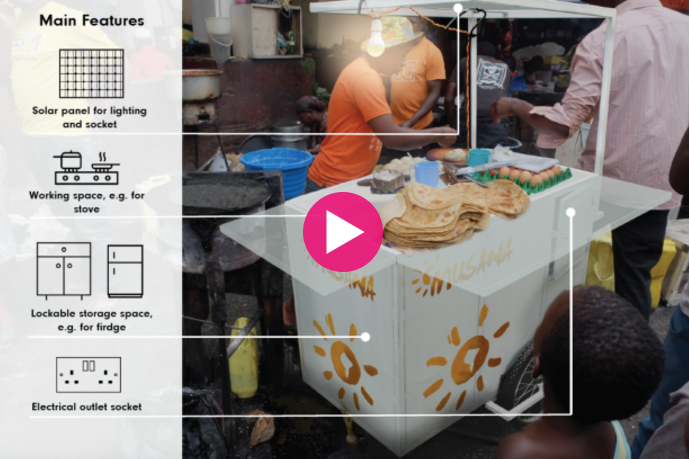
4. Break free from the norm.
Listening to your customers is necessary, but as Henry Ford, the founder of Ford, said, “If I had asked people what they wanted, they would have said faster horses,” following their requests and doing what they ask you to do are a different story.
It is your customers’ “potential” need that you need to figure out when you listen to them. Henry Ford was smart enough to know that, and that’s why he invented Ford cars, not giving faster horses to people. But here is another question; then what?
You should know that a few ideas that you’d come up with when you start thinking of the best ways to tackle social issues are ones that tens of thousands of people even have already tried.
For example, poverty is not an issue that recently rises, but it exists for a long time. Everyone knows that poverty still exists on the earth and still needs to be addressed. You need to come up with an innovative solution to address social issues that nobody could have ever solved. Our Change Creator magazine can show you so many innovative and creative ideas with great social entrepreneurs. You should check it out!
5. Don’t be overwhelmed.
You might find out that you have SO MANY things to do and might not see yourself reach the goal yet, but that’s ok. Remember the four other things I mentioned above, keep your own pace, address the issue by one step at the time and even ask other social entrepreneurs for help if needed. You are not alone, and we need you. You are one of the most amazing people on this planet, and again, we need you. Please always remember that.
As I told you at the beginning, social entrepreneurs sound very special, but they are also people.
This blog is a reminder that you can also be one of them, or you are already one of them. If you don’t do those top 5 “Don’ts,” you’ll become a great social entrepreneur who can create a positive impact on the world.
3 Powerful Lessons From Award Winning Social Entrepreneurs
There are many articles about what success is or how to be successful.
Personally, I believe it’s an important topic to study on a regular basis so you can learn the different perspectives and avoid a critical trap which I’ll talk more about later. Some people study success their whole life!
Those are two different questions and it’s important to understand the “what” to get to the right “how”.
The “What” (Level setting on what success is)
We’ve all probably said to ourselves at one time or another, “if I could just make $XXX about of money, I would be happy.”
After all, how great would it be to have all of your basic needs met, and then plenty left over for fancy cars , first-class vacations, maybe a boat or fine dining whenever you wanted?
Making money is a good thing, there’s nothing wrong with it. It might not buy happiness but it can make life easier and even allow you to impact other people’s lives positively.
The fact of the matter is that we live in an economic system that requires us to have money to live and put food on the table.
But there is a trap to be aware of.
The trap is when you’re led to believe that abundant wealth alone will get you to the destination of success and happiness. For example, studies have actually shown that once you cover your basic needs, increased wealth doesn’t create increased happiness.
While it doesn’t hurt to have those things it’s important to remember there is so much more to life.
Real riches that no money could ever buy- like meaning, fulfillment, family, generosity and appreciation – are found through other means, not simply through amassing money. We have to consider the full spectrum of human needs.
Many wealthy people have battled depression, anxiety, substance abuse, or have suffered from poor relationships. The point is this: those who are filthy rich have problems just like everyone else.
We recently had the honor of interviewing Tony Robbins for the March 2017 edition of our magazine Change Creator. This is a guy who has studied success all his life and is a world of wisdom. My first question to him was, “how do you define success today and has it changed over time”?
He shared a ton of insight and while I’m not going to get into all of it here, these were some of what I felt were his most important points:
- The more money you make, the more you spend and spending money is not fulfilling.
- A state of gratitude and appreciation are essential, as Tony believes that without those things, you have nothing.
- Pursuing your mission or your passion is a critical part of fulfillment and usually is not driven by money.
Would sitting at a desk doing accounting all day for 40 years be fulfilling? Sorry to any accountants reading this but not for me! Can you live your life purpose and make great money, hell yes! But that money becomes a byproduct of your passion.
Let’s talk about the how.
The “How” (3 Lessons for Success)
Every year the Skoll Foundation gives awards to entrepreneurs that are changing cultures and impacting lives through the living they make or the mission they are on. I have now interviewed 3 of those award winning social entrepreneurs and their stories are nothing short of inspirational.
If you’re not familiar with the Skoll Foundation, it was founded by Jeff Skoll in 1999 and is a foundation that drives change by investing in social entrepreneurs and innovators who help to solve the world’s most pressing problems.
“Bet on good people doing good things” ~John W. Gardner
A social entrepreneur is a person who uses entrepreneurial skills to solve a social and/or environmental problem by shifting the current “norm” of a system or culture. Systems come in all shapes and sizes.
These social entrepreneurs are motivated by a passion to help others. They are impacting lives and making the world a better place. That is something that is very fulfilling and will motivate you to wake up each day without the alarm clock. I like to call that the “Christmas Eve Effect”.
3 Priceless Lessons Learned
A quick tip before I dive into it. The mental game is a HUGE. Why? Because what you think drives your actions.
“Whether you think you can or you think you can’t, you’re right.” ~Henry Ford
Lesson 1: Remain curious but stick to core beliefs
Mallika Dutt is the founder of the organization, Breakthrough and is a 2016 Skoll Foundation social entrepreneur awardee. She’s an energetic and passionate woman who is no stranger to taking risk. I was lucky to chat with her for our August 2016 edition of the magazine. Her organization, Breakthrough, is a global human rights organization striving to build a world in which violence against women and girls is unacceptable. This is a big challenge in India where she grew up. Her approach doesn’t just target women, her message is for all human beings to thrive.
How do you tackle such an overwhelming issue? For Mallika, creating deep radical change started with pop culture. She decided to experiment with a music album and music video. Taking on pop culture to talk about an issue was a revolutionary idea. Everyone told her that nobody wanted to hear music that was preachy.
Mallika even got Virgin records to back her with marketing support but they also did not agree with the music video storyline, saying it won’t work, and pulled their financial backing for development of the video. This meant Mallika had to figure out how to fund the development herself.
“Everyone in the entertainment industry thought i was crazy.” ~Mallika Dutt
Mallika many many small changes but the message was her core belief so she didn’t change direction but found a poetic writer to create powerful lyrics and studied all the great music videos she could find to understand what works.
Breakthrough’s video – Mann Ke Manjeere’ became the winner of the Screen Awards 2001 in India and nominated for MTV’s “Best Indipop Music Video”, reaching 26 million households.
Lesson Learned: Remain curious but stick to core beliefs
“Remain curious, engage, listen to the wisdom of others and then check back in with yourself, your heart and your gut and what you really believe in and at every point go through that dance because there will some things that are very easy to shift and change and there will be other things that are so core to what you believe in that giving up on that means giving up on yourself.” ~Mallika Dutt (Change Creator Interview)
When you’re pursuing something that aligns to your values and is deeply important to you it is a mission. It’s top priority.
You can either be swayed by others to give up on your belief or you can be so passionate that you become stubborn and forget to be curious and listen to the wisdom of others.
As Mallika showed, it’s important to stick to your core belief and at the same time continue to listen to others and change the easy things that can be shifted. Staying the course requires courage and persistence.
Lesson 2: Ideate and Explore the Unknown
Dr. Harris Harris (or Al as he prefers) is the founder of the company Blue Ventures. He is a Skoll Foundation social entrepreneur awardee, received the WWF Duke of Edinburgh conservation award and is an Ashoka fellow. Al was a reluctant social entrepreneur I spoke with for our December 2016 edition of Change Creator magazine. His story is truly inspiring.
As a biologist with a passion for coral reefs and marine life he learned that the native peoples of Madagascar, the Vezo, and trawlers were taxing the ecosystems at an alarming rate. For the Vezo, it was about putting food on the table for their family.
Al quickly realized that something had to change which meant discovering new tools and approaches to engage the people. However, he didn’t have money or a plan to do such work. “I decided to hang up my diving fins and try to develop business-based solutions to the problems I was seeing”, said Al. This is when Blue Ventures was born.
Venturing into the unknown, Al, began experimenting with new conservation techniques working closely with the Vezo. Those ideas were met with much skepticism at first. How do you ask someone not to fish when their families need food on the table?
But the experiment turned out to be a success and the Vezo became believers. Neighboring communities grew interested in replicating the process which then scaled up the coastline. At the heart of the Blue Ventures business model is eco tourism funded their conservation efforts. Actually, during the early phases of Blue Ventures, people just started sending Al checks because they were eager to take eco-tourism trips. Living in a world where money needs to be made, Al made financial sustainability a must from the start and built his model around paying his team and other expenses. Without it, the lights go off.
As you might have heard, innovation is a must in the world of entrepreneurship. New challenges tend to require a willingness and the courage to explore the unknown for new solutions. Al never ran a business or executed the solutions he hypothesized. He fully assessed the situation and determined what he would need to run an experiment. He was willing to take a risk to test a new idea he believed in.
Lesson 3: Mission & Money Work Together
When people think of social impact and the idea of social entrepreneurship they might relate it specifically to nonprofit structures only or believe that good money cannot be earned. That’s simply not true and has been proven otherwise many times. Running an impact business has proven to do quite well. Look at TOMs or Sevenly.
Al’s top priority was conservation. But after assessing the problem he quickly realized he would need to figure out a way to fund his mission. That is where eco-tourism came into play. This created jobs for the locals and funds his business extremely well. At the same time this model exposes more people to the beautiful natural habitat and people that live there giving them an amazing experience to remember.
While money was not the primary reason for Blue Ventures creation, it was important that his business model baked in financial sustainability.
Blue Ventures would not have been able to scale and expand its conservation efforts without a smart business model. Al believes that the business model was key because using donations as an ongoing source of funding is unstable and vulnerable.
The mission and passion are the motivator or purpose and the money is a tool for growth and continued success.
Final Thoughts
With today’s world of endless marketing and an economic system driven by money it’s easy to lose sight of what’s important. We need to keep in mind abundant wealth alone will not take you to your destination of success and happiness.
Don’t be fooled. As we can learn from those who study the dynamics of success and what it truly means in life, we find that it goes far beyond the collection of material possessions or money. It captures the heart of a person and what they were born to do in life, their mission and purpose. These are elements of the human condition that truly motivate us and provide a sense of fulfillment.
Mallika Dutt and Dr. Alasdair Harris were both motivated and driven by problems near to their heart. This gave them the energy and will to persist through even the greatest challenges. They were unstoppable and believed deeply in what they were doing.
Their success can teach us powerful lessons that should be considered seriously. Always remain curious and listen to the wisdom of others so you can pivot where possible but don’t change your core belief or primary mission. Both stories demonstrate this.
When approaching new challenges you have to be willing to explore new solutions that might not work out. We have all heard that you need to take risk and while this sounds basic, it holds a lot of truth. Again, both stories illuminate this very well. I hope you see the trend now with these award winning social entrepreneurs.
No business can be sustained or scale without a smart business model for income. It’s how the world works so bake it in from the start but don’t let be your mission, it’s a tool to support the mission.
“Great companies start because the founders want to change the world… not make a fast buck.” ~Guy Kawasaki
How to Be Motivated – 5 Ways to Find Motivation Before You Hit the Big Time
How do you find motivation when you in the trenches working towards your goals? Here are five proven ways to harness that motivation so you can get more things done and achieve those really big dreams!
Continue reading4 Characteristics of a Successful Social Entrepreneur (Got What it Takes?)
What are the foundational elements to becoming a successful social entrepreneurs. At Change Creator we have interviewed a lot of them and want to share some inspiring pearls of wisdom with a little perspective.
Continue readingBelief is Irresistible: What You Need to Know About Belief in Your Mission
In this new segment of the Change Creator Podcast, our founder, Adam G. Force, is taking a shot at a fresh idea in response to questions from the audience by sharing his experiences with Change Creator unedited. Hear the good to learn from successes and the bad to avoid the same mistakes. You got something to share? Stop by our website and send us note, let’s have that conversation.
Continue readingWhat it Takes to Achieve Something Great
Experiences in our life shape who we are and many times some of the greatest lessons of your life take place, whether we know it or not. But when you look back and analyze it you can discover that lesson. Here’s something powerful I learned from an intense situation when I was wrestling at the age of 12.
Continue readingHow to Get Unstuck: Lessons on Moving Forward That You’ll Love
Don’t wait for the world to tell you when you are ready. Start something now. Take it from Tyrion Lannister, a.k.a. Peter Dinklage, you just have to make a decision and get moving. Here are some thoughts on how to get ‘unstuck’ and moving.
Continue reading5 Ways To Stay Highly Productive and On Your Game
Most people don’t realize how many opportunities we have each day to practice mindful meditation. You literally get a new chance with each breath. So why take the time? A recent study discovered that even a few weeks of meditation training improved participants’ focus and memory for the verbal reasoning section of the GRE (with a 16 percentile point score increase).
Continue readingAuthenticity
In this new segment of the Change Creator Podcast, our founder, Adam G. Force, is taking a shot at a fresh idea in response to questions from the audience by sharing his experiences with Change Creator unedited.
Continue reading7 Productivity Myths Busted: Are You Falling For Any Of These?
When you’re starting a social business, there are a gazillion things you can do to get it off the ground, spread the message and bring about the change you want to see in the world. You try your best to do it all – get the newest gadgets, spend more hours at your desk every day and even multitask like your life depended on it.
Continue readingHow to Overcome Life Challenges and Pursue Your Mission
In this special interview we talk to Iffit Qureshi who was deeply impacted by the terrorist attacks that took place in Oslo, Norway, in addition to life events that would have caused most people to quit. Learn how she overcame her challenges and is now pursuing her mission in life.
Continue reading5 Expert Strategies on Overcoming Your Fears
If you’ve ever thought about changing careers, or asking your boss for a promotion, or maybe starting your own business, but you thought, “Why take a risk? I might not be completely satisfied with what I have now, but at least it’s safe, and I get a steady paycheck,” maybe it’s time to think again. It might be true that you’re choosing caution over risk, but you have to consider that what’s really holding you back is fear.
Everyone Contends with Fear
The first thing you should know is that you’re not alone. Most people experience fear at one point or another in their careers. They fear failure, or losing money, or perhaps looking foolish. Those are not unreasonable concerns, but letting them prevent you from following your dreams isn’t without its own risks. You might, for example, be nagged for years by the feeling that you lost a golden opportunity. The truth is, what most people regret as their near the end of their careers is not their failures, but their inaction.
It’s OK to Be Afraid
Fear is normal—it’s part of our genetic makeup, a survival instinct that prevents us from unwittingly entering potentially hazardous situations. What’s not OK is being so overwhelmed with fear that you shy away from a potentially better life.
Patricia DiVecchio is a business and work coach who helps her clients overcome their fears and realize their ambitions. The author of Evolutionary Work: Unleashing Your Potential in Extraordinary Times (Pearhouse Press), and president of International Purpose, DiVecchio has been helping people for more than 25 years manage fear and uncover their work potential and purpose.
Her advice to her clients? Instead of running from your fears, embrace them and treat them as an ally. As she told Forbes recently:
“(Fear) can be a great motivator, a great teacher. We don’t see it like that. We tend to run away from fear, back, or shy away from it, instead of stepping into it. You need to recognize it as something you can learn from. You need to shake hands with your fear and enlist it as a friend- a force to encourage forward movement, rather than something to hide from.”
Here are 5 primary strategies she recommends to embrace your fear and use it to motivate positive action:
1. Make It Concrete
One of the ways fear paralyzes us is through its lack of form. Fear is nebulous, and for this reason difficult to get a hold of and overcome. DiVecchio puts her clients through an exercise in which they draw a picture of what their fear looks like. One of her clients, for example, drew himself afraid as a rickety old car on a road filled with potholes. In making his fear tangible, he was able to grasp its power over him and conquer it.
2. Give Your Fear a Voice
DiVecchio recommends keeping a journal in which you articulate your fear, and monitor how it changes over time. You can’t change what you don’t acknowledge—a journal forces you to confess your fears to yourself, and, in so doing, learn from them.
For example, if you have the desire to begin investing in the stock market, but are afraid you’ll lose the money you invest, writing about that fear might help you make more reasoned investments, or seek the advice of a competent broker. You’ll also be able to examine “the worst that could happen,” and realize that even that worst-case scenario would not be the end of the world.
3. Take Small Steps
Fear often has the power to paralyze us and lead us to complete inaction. To pull yourself out of this trap, do one small thing each day that you’re afraid to do. For example, if you are considering leaving your 9-to-5 job to start your own business, you could begin by doing a little research each day, or calling a trusted mentor for advice. Each small step you take will give you a sense of accomplishment and convince you that you can take another step, and another after that.
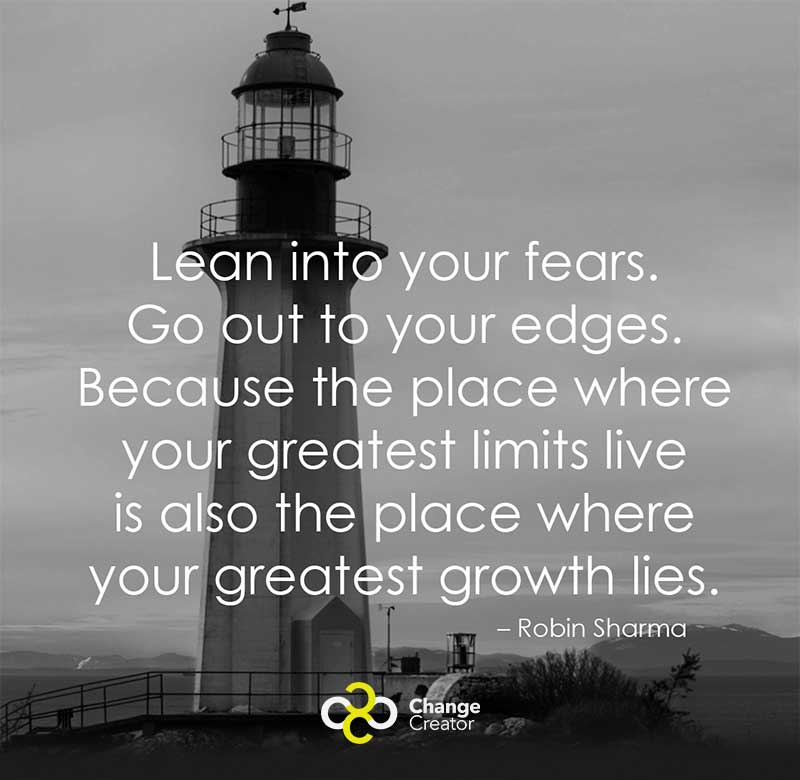
4. Practice “the Three E’s”
When we’re afraid, we become convinced that we’re not especially good at anything. This, of course, is not true—everyone has innate skills and capabilities—those things which are not the result of education or experience, but inherent—and everyone needs to remind himself of what those talents are. DiVecchio tells her clients to write about the three E’s: the things that come to you easily, effortlessly, and are exciting, and then to act upon them confidently, perhaps to launch a new career that otherwise might not have occurred to you.
5. Reach out to Trusted Friends and Family
Many people have no clue about where their talents lie. Take the time to interview several people who know you and whose opinions you value. Ask them what they think you’re better at than just about anyone else.
You’ll be surprised to see patterns emerge, similarities in their responses which will help you identify your strengths and act with confidence upon them. It’s sometimes said, “if 5 people tell you you’re sick, see a doctor.” By the same token, if 5 people you trust tell you you’re an outstanding writer, or the first person they come to for advice, believe them.
Final Words
Success can be as scary as failure—it often brings added responsibilities, and the need to maintain that success over time. It means the kind of change and transformation that you might be afraid to embrace. The good news is that there are competent professionals who are skilled at inspiring and empowering their clients to earn a meaningful living that positively impacts the world.
What have been your greatest challenges with fear and how did you overcome them? Share in the comments because we’d love to hear from you.
Related:
Creating Change from the Inside Out as a Social Entrepreneur
“When it comes to action” he said, “you have to think about building a team, partnerships, testing your idea, developing your business, a business model, raising funds, creating an advisory board and a board of directors or scaling your work…” James gets nods of agreement from the rest of the Fellows, some offered additional points to consider.
All of them had shared ideas of what is needed at each point of the framework underlying the course we call the ‘Inner Journey of the Changemaker’ at Amani Institute. I took a deep breath. This was my fourth year facilitating the course and each time this is the moment when I get excited because this is where things get real.
It’s not difficult to think of the elements needed to start, build and grow a social enterprise. What we usually come to think of way later, when we are in the midst of what they call ‘baptism by fire,’ is how we as a person affect the outcomes of all the above. To a large extent, our work stands and falls with ourselves.
 Building a team – how do you choose the right people? How do the ways you have come to learn to communicate, resolve conflicts and navigate people’s strengths, and weaknesses affect the outcomes of your work? How does your weak follow-up game affect your partnerships? Or are you too eager? How does your fear that they might not like your work, or worse, yourself, affect your communication and strategy with them? What about your relationship to hearing ‘No’ and general rejection?
Building a team – how do you choose the right people? How do the ways you have come to learn to communicate, resolve conflicts and navigate people’s strengths, and weaknesses affect the outcomes of your work? How does your weak follow-up game affect your partnerships? Or are you too eager? How does your fear that they might not like your work, or worse, yourself, affect your communication and strategy with them? What about your relationship to hearing ‘No’ and general rejection?
How does your fear that your idea may not be that good affect your prototyping? Or maybe you don’t have fears but are overtly confident and don’t know it, but you are a terrible listener, and your design thinking prototype sucked and just served to check a box but didn’t provide you actual information to co-create a solution to the problem you want to address?
What about developing the business? Are you prioritizing things right? Wait, did you already burn out? Do you know how to sustain your health, relationships, and family while pursuing that dream of change?
What about your relationship with money? Do you know how to understand potential funders and how your story connects with their desires? Did you learn how to pitch but you still find 1001 reasons to procrastinate building the pipeline? Do you over-promise? Do you sleep at night?
Do you have the courage to ask the right people to join your advisory board or board of directors? Do you know when is the right moment to ask them? Are you self-deprecating or too pushy? Do you know how to listen?
“The quality of your work, no matter as an entrepreneur or as an intrapreneur, depends on how you can navigate yourself and grow into who you truly want to become.”
Do you know yourself? Do you know that changing the world requires changing yourself?
Looking at James and the 18 other Fellows from 10 different countries and incredibly diverse backgrounds, I said: ‘Welcome to the Inner Journey of the Changemaker. In this course, we will explore what it takes to unlock your potential and sustain your work in the long run. To every external aspect of our work is an inner aspect that is determined by our story and who we have become. The quality of your work, no matter as an entrepreneur or as an intrapreneur, depends on how you can navigate yourself and grow into who you truly want to become.’
It blows my mind that we still don’t have curricula in mainstream education – from Kindergarten to University – that take advantage of the vast knowledge out there on how to unlock our potential, become more resilient and flexible in how we communicate and resolve conflicts, instead of depending on replicating our families’ and communities’ patterns. There is a reason we have a multi-billion dollar coaching – and therapy – industry.
In this ongoing column, I will share insights we have gathered at Amani Institute teaching ‘the Inner Journey of the Changemaker’ which is an integral part of our Postgraduate Certificate in Social Innovation Management aimed at helping people to build careers of meaning and impact.
Next, I will explore the issue of passion and purpose and how understanding your true north can set the direction and impact of the change you want to create.
Put yourself out there and do work that creates value for people and the planet with the skills you already have: This is an instant recipe for meaning.
Moment of Obligation
“I do this because when I got raped and when I got my diagnosis, I wished there was a safe space where people had shared their narratives that I could tap into and get the strength to move forward.” Sitawa Wafula, Amani Institute alumni and New Voices Fellow at Aspen Institute, shares her personal story as a rape survivor and mental health diagnosis as part of her work championing Mental Health in Africa and beyond through ‘My Mind My Funk’ – a information and support hub located in Kenya.
In her story, she didn’t really see any other option but create a solution for something she needed – her life’s purpose revealed itself in her greatest struggle.
Stories like this carry immense power in their vulnerability and in how they show how the medicine you create for your wounds sometimes can become your biggest gift to the world. However – not all Changemakers have such stories or are aware of the power of their own.
In a world of which we speak a lot about passion, more and more people are asking how they can connect this to purpose. A reason to get out of your bed every morning that is larger than yourself.
I work with people who are looking to switch their career from the private to the social change sector as well as professionals who have hit a wall in their work as a social entrepreneur or NGO employee or students who know that they ‘want to change the world’ but are not sure yet really how.
There are two reasons why better understanding your underlying motifs and the values that guide them is relevant for you as a Changemaker:
- There are many, many, many challenges – and tackling them is incredibly challenging. So, first of all, if you get lost in the jungle of options, it helps to know what is most important to you to make decisions.
- And secondly, of you get tired and lose all hope it helps to remember why you are doing this to refuel and recover.
So you need both – a guiding star and an anchor. You need your vision and your why. In his book “Sharing Wisdom From Over 125 Outstanding Leaders”, acclaimed former Medtronic CEO Bill George calls this the ‘True North.’
One thing we can learn from people who have a track record in sustaining a career in creating social change is that they are deeply aligned with their ‘why.’
One of our instructors, Jerry White, who is known for leading high-impact campaigns including the historic International Campaign to Ban Landmines that won a Peace Nobel Prize in 1997, points out that most social entrepreneurs are very clear about what they want to do and how they are going to do it but not why.
Why you do it is an inquiry into who you are, something that in philosophy and wisdom scriptures all over the world is at the core of transformational leadership narratives. He claims that if we use technical solutions in a knowledge-based approach, we often create more damage than good and miss a wiser approach that arises when we are aligned with our ‘True North.’
Watch him speak about this in detail in this video taken during an Ashoka Fellowship Program:
Not every story is as seemingly clear-cut as Sitawa’s. Some people have a single transformative moment; others have a feeling it has always been in their cards to do what they do, and others have more of a slow burning that reveals itself over time in the conviction that a fulfilling life includes answering the question what the world needs from them.
For those who are desperately looking to find a name for their purpose, I strongly recommend to taking the pressure off the Quest. As Dr. Vincent Ogutu, Vice Dean Executive Talent Development at Kenya’s Strathmore Business School shared with our Fellows at Amani Institute: Put yourself out there and do work that creates value for people and the planet with the skills you already have: This is an instant recipe for meaning. You may stumble over your deeper ‘why’ in the process, as he did when doing an impromptu speaking engagement in a prison – but you don’t need to have it to start doing meaningful work.
Ways of inquiring your moment(s) of obligation include identifying your values and vision through biographic work or looking into what we call the ‘wound-gift’ concept. You can do it by yourself or with a mentor or coach. In any case it is a process of inquiry that needs your engagement with the world to fully reveal itself – reflection alone doesn’t cut it.
This article was originally published in two part for issue 4 and 5 of Change Creator magazine by Geraldine Hepp of the Amani Institute.
Reinvent Yourself: Experience Life Like Never Before [Free Download]
If you’re ready for a higher quality of life, download “Reinvent Yourself” to explore expert insights that show you exactly what it takes to get there.
Continue readingWhy You’re Not Hitting Your Goals, and How to Fix That (5 steps)
There was a time when my big question was, “what do I need to do to make steady and meaningful progress toward my life vision while not getting sidetracked by unproductive tasks?” It’s a topic I continuously assess and try to improve.
Continue readingHow to Start Finding Clarity on Your Life Mission: 5 Key Tips
Have you thought to yourself, “What am I really doing with my life and what will I be doing in 10 years?” You might be fed up with your 9am-5pm “job”, looking for work out of college or maybe you run a startup that’s isn’t giving you the sense of fulfillment you hoped for.
Continue readingHow to Clearly Define Your Picture of Success
Entrepreneurship and especially the startup phase requires a favorite picture, but it’s not an actual photo or depiction of something existing, it’s a vision of something to come that resembles your ideal.
Continue reading25 Ways to Spend Your Next Pomodoro Break
So you’ve jumped on board with the Pomodoro technique and you are easing into the routine of working for 25 minutes followed by a five-minute break. But as those breaks emerge, you aren’t always sure how to spend them to best use your decompression time. We’ve put together a list of 25 break ideas for […]
Continue reading6 Lessons to Transform Your Habits and Find Clarity With Joel Brown
Interview with founder of Addicted 2 Success, Joel Brown.
With a website that has received more than 50-million unique visitors, a popular podcast show, and an upcoming role in a movie, Joel Brown is by most standards, a successful man – some might even say he is addicted to success.
Indeed, Addicted2Success is the name of Joel’s thriving self-development brand. It is a name which he admits might cause a little eye-rolling in some people. But this is not the self-serving tale you might expect.
Joel Brown’s mission is to pass on the tools, habits, and mindset that make people successful. The rewards he gets are just a pleasant side effect of his always-giving mentality. He loves nothing more than sharing practical and proven steps so that others can achieve their desires.
Lesson number one: The more you give, the more you get.
It’s Okay to Change Your Passion.
Some people find their “one” passion early and spend their whole lives dedicated to fulfilling it. Joel Brown was not one of those people. He had stints in the music industry, sales, and even spent time saving wild animals in the desert in North West Australia. Except for the music industry, nothing else stirred his passion.
Passion, it seems, is a curious thing. One day you might have it, and the next day it could be gone. At age 13, Joel knew he had a passion for music. He loved beat-making, producing, and DJ’ing. He even started producing shows for local radio stations after exercising his instinctive persuasion skills.
Throughout his tender teen years, Joel showed the kind of persistence and determination that was sure to lead to a long and thriving career in the music industry. However, he gave it all up. Somewhere along the way he lost his passion for music.
Giving up on music was the first time Joel had given up on anything, and it felt strange. He knew, however, that it was the right thing to do. New life experiences and changes in the way we look at life can cause a shift in the things that once made us passionate.
That is what happened to Joel, and so he left his music career behind. But, not long after, he developed an even stronger passion.
Lesson number two: We don’t just have one passion in life: values change, experiences come, new passions surface.
The Key Ingredients of Success
Joel Brown is not the only person to have lost a passion in life. He also wasn’t the only twenty-four-year-old to find himself in a slump. That can often happen when you suddenly find yourself without a cause in life. One of the primary cures for this, it seems, is to find a new passion.
Joel found his new cause after a chance meeting with Jordan Belfort. The sales company that Joel was working for organized a workshop, and he was able to meet the Wolf of Wall Street face-to-face. That meeting changed Joel’s life. He learned the importance of having clarity, of thinking big, and of having a long-term vision.
These are key ingredients in the recipe for success. Clarity of mind allows you to stay focused on primary goals, thinking big prepares you to exceed those goals, and with the long-term vision, you can envisage and plan for potential obstacles.
After meeting Jordan, Joel became a man on a mission. He began devouring self-help books, listening to motivational speakers such as Anthony Robbins, and carefully mapping out his life plan.
It is, as Joel teaches, important to document your goals and visions. But, more importantly, you need to “write down how you’re going to get to where you want to be.” Not many people have a fair idea of where they want to be in 5, 10, or 15 years, but when pressed can usually give a broad description of how they intend to achieve their goals.
Writing it down on paper, however, forces you to get things out of your head in some detail and acts as your roadmap. Seeing is believing, as they say, and once it is written down you will have a clearer picture.
Lesson number three: Spend time on Clarity. Write down your goals and chart your roadmap to achieving those goals.
Related: What you need to know about creating new habits
Too Much Time vs. Not Enough Energy
One of the most important things that happened when Joel met Jordan was his shift in mindset. He becamehungry for self-improvement and gained a desire to make a meaningful impact on the world. He found another passion outside of music and became energized once again. The whole experience revealed another interesting thing; when you are passionate about something you become massively energetic.
Even though Joel was still working 12-hour days at his sales job, he still found the time to work on his media platform, addicted2success. Instead of asking. Like most people do, “how do I find time,” Joel asked, “how can I make time.” He was so passionate about his new project that he would complete his days at the sales job and head straight home to work on developing his new business. It wasn’t long until he was able to leave his sales job and commit full-time to the new business.
Time for Joel is important, but he also values energy above all else. Some people complain about the lack of time, but spend the bulk of it camped out on the sofa in front of the television. People who value time over energy might live to eighty but, says Joel, “I’d rather be the guy who lives to 50 years, who gets up every day, travels the world, and experiences everything that life has to offer because I had enough energy.”
Lesson number four: Do things that light you up; energize you; make you feel alive. Having lots of energy is more fulfilling than having too much time.
External Influences On the Internal Mind
They say you are the average of the five people you spend time with. That is because your network of friends has a powerful effect on your behavior, mindset, and unconscious mind. The books you read, the things you watch, and the websites you frequent all have a similar effect as your network of friends. They create habits.
Back in 2011, when Joel first discovered his new passion for helping others succeed, he began reading, watching, and listening to as much self-help material as he could get his hands on. He started tuning his mind to a new way of thinking, creating new behavioral habits. He became less motivated by money and more driven by the need for freedom and wisdom. The unconscious mind, as Joel says, is stubborn. You have to force it into a new way of thinking, and that will often require a change of external influences. When you have successfully imprinted new information on your unconscious mind, knowledge becomes wisdom. Joel says, “Wisdom is more powerful than knowledge.”
Lesson number five: Success often requires a change of mindset; a change of mindset often requires different external influences.
A Unique Way to Win the Battle for Success
Passion and motivation differ for everyone, but they can normally be identified by the energy they bring to your life. Joel gets energetic by giving and helping others succeed. He loves creating things and giving it to the world, knowing that someone, somewhere will benefit from his work.
Joel is not the first or only self-help professional out there. But he is by most standards a huge success. The reason is that he stands out from the crowd. He stands out because he knows what he is talking about, he has a genuine willingness to help people, and he is exceptional at what he does.
Uniqueness, Joel says, is the best way to win in business. You need to bring something different to the table. You need to be outstanding. And with the lessons he gives, you will have all the tools needed to become an outstanding success.
Lesson number six: You don’t have to be the first or the only, but you must be unique.
3 Success Tips from TOM’s Founder Blake Mycoskie You’ll Love
Blake Mycoskie started his first business when he dropped out of college after his sophomore year. The company, EZ Laundry, soon employed more than 40 people, and was generating close to $1 million in sales. Blake sold that company in 1999.
He went on to create an outdoor billboard company, co-found a cable network, an online driver’s education service, and a marketing firm specializing in brand development and viral marketing.
While in Argentina in 2006, Blake met his future wife. The charity she was involved in inspired him to create Shoes for Better Tomorrows (TOMS).

TOMS has expanded from its beginnings as a one for one for-profit company, donating one pair of shoes to an impoverished child for every pair of shoes sold. Now TOMS donates sight-saving surgeries from their line of sunglasses, and a TOMS Bag purchase supports Giving Partners, delivering vital materials and training needed to help provide a safe birth regardless of the facility.
In 2011 Blake wrote the New York Times bestselling book, Start Something That Matters. The book tells the story of TOMS. The book also gives six simple keys for creating or transforming your own life and business.
Here are 3 success tips from Blake Mycoskie that are unique and thought to provoke.
ONE: On where to get business advice, Blake says:
You don’t always need to talk with experts; sometimes the consumer, who just might be a friend or acquaintance, is your best consultant.
TWO: Blake’s tip for efficiency:
The best tool I have for efficiency is always carrying a journal and as simple as that sounds, one of the things that is most exhausting for a human being is remembering things. So what I found is anytime I have an idea or thought or something I want to do, if I write it down as part of a continuous list, then my mind doesn’t have to store it, so my mind can be more efficient and more creative by not having to remember all these things.
THREE: Blake’s thought on one the one for one business model:
Giving builds loyal customers and turns those customers into supporters…You can find passion and profit and meaning all at once, right now.
Blake’s experiences are inspiring to people all over the world. If you’d like to create a business with purpose check out our Essential Startup Guide for the direction you need to get going!
Further read:
What is a Social Entrepreneur?
The terms social entrepreneur and social entrepreneurship were used first in the literature to social change in the 1960s and 1970s. The terms became more popular in the 1980s and 1990s, promoted by Bill Drayton, the founder of Ashoka, and others such as Charles Leadbeater.
What is a social entrepreneur?
Before the term gained traction, those who fit this description were outsiders or radicals that seemed to bring positive change to deprived communities single-handedly. Characterized as extremely optimistic visionaries who had infinite willpower, they use entrepreneurial skills and innovation to address significant social and/or environmental problems. Profit did not motivate this free-thinking and inspirational group. Years ago they didn’t have a name but today we call them, Social Entrepreneurs.
Similar to the way business entrepreneurs change the face of business, social entrepreneurs act as the change agents for society, seizing opportunities others miss to improve systems, invent new approaches, and create solutions to change the world around us for the better.
We support all efforts to use business as a tool for positive impact. Some groups, such as the Skoll Foundation, define social entrepreneurship more specifically as changing the equilibrium of an established system.
We use the term “Change Creator” and define it as: A person who uses entrepreneurial skills and innovation to improve the wellbeing of people, animals, and/or the environment. They use business and organizations as a tool for change and have a vision to benefit the planet as a whole.
A social entrepreneur or “Change Creator”, can operate a nonprofit organization or a for-profit business. Each can serve a purpose for the greater good making real change in the world.
Business with a Purpose.
We call this, business with purpose.
There are many amazing people around the world doing great things as social entrepreneurs.
Here are a few well-known social entrepreneurs.
-
Muhammad Yunus
Muhammad started Grameen Bank in Bangladesh in 1976. Yunus was teaching economics when a terrible famine hit the region, leaving people starving to death in the streets. His solution was to provide collateral-free micro-loans to the very poorest people in the area, allowing the poor to fund their small businesses and stop the cycle of poverty. The result has been nothing short of incredible: with $4.7 billion provided to 4.4 million families in Bangladesh, Yunus has kept millions of people out of poverty. Today more than 250 other institutions follow the same micro-lending model.
2. Daniel Ben-Horin, Founder of Techsoup Global
Daniel was elected as a Senior Fellow for his work as a leading social entrepreneur by Ashoka. The Nonprofit Technology Enterprise Network awarded him its Lifetime Achievement Award, and the Nonprofit Times included him on its annual list of “50 Most Influential People in the Nonprofit Sector” In 1987 he founded an organization under the name CompuMentor which evolved into Techsoup and Techsoup Global as the internet started to become a vital tool for nonprofits to change the game. Their mission is to connect nonprofits with the technology they need to progress in their causes. Today, they have over 200 employees, an annual budget of $30MM+, and are in over 235 countries/territories. Their network has now reached 690,000 organizations and delivered over US$5 billion in technology tools and philanthropic services.
3. Dale Partridge, Founder of Sevenly
Dale is a social entrepreneur on a mission to inspire more generosity in the world. Sevenly sells apparel that provides $7 from each purchase to charity. Each week they work with a new charity. They have raised over $4.4 million and helped save or improve many lives.
4. Scott Harrison, Founder of charity: water
Scott went from a being well-established club promoter to a volunteer around the world and had experiences that completely changed his perspective. He was impacted by his experiences so deeply that today he has now helped millions of people gain access to clean water and continues to do so. To date, charity: water people like you have funded 17,370 water projects in 24 countries!
5. Susan B. Anthony, Social Reformer
Susan B. Anthony is a historical figure who was a leading social entrepreneur. She fought for women’s rights in the United States, including the right to control property and helped spearhead the adoption of the 19th Amendment.
Interested in Becoming a Social Entrepreneur? Well, you’re in the right place. Our goal is to give you the tools, and insights necessary to invigorate that drive to be a social entrepreneur.
If you have a way to solve a social problem, you can start your social enterprise now. Starting a social enterprise will vary in complexity depending on the task at hand, non-profit or for-profit status, and funding. Seek the guidance of friends, business professionals, and fellow social entrepreneurs, and you could be on your way to changing the world in no time.
The potential for growth is huge. The internet is opening up new avenues for social collaboration. Social entrepreneurship will continue to come from many more sources. It needs to become a mass activity, not just the domain of inspirational mavericks.
Are you the next Change Creator?
You may also enjoy:
4 Destructive Mental Habits That Successful People Don’t Have
Habits are more than just the things that you do; they’re who you are and how you feel. Your habits define the amount of success you can achieve and how you’re destined to react to any given situation. And there are four destructive mental habits that successful people don’t have. Each one will erode your mental and emotional resources, drive you to make bad decisions, deplete your energy, and waste time that you’ll never get back.
1. Waste
Successful people know how much energy they have before decision fatigue sets in, and they only use their energy to move them toward their goals. On the other hand, most unsuccessful people waste more energy than they purposefully expend. Start treating your mental energy like a scarce resource, and say no to distractions and extraneous tasks. You’ll be amazed at how much more focused you’ll be on your goals when you stop giving away your mental energy.
2. Worry
Successful people are faced with problems and decisions that would make others curl into a ball in the corner and cry for their mommies. But they face these issues with clarity and calm, and avert crises on a daily basis. They’re able to accomplish this by recognizing the futility of worrying. Worry isn’t a solution, it’s just a bad habit that many people can just as easily decide not to make. Most people worry because they are choosing to focus on variables outside of their control. Successful people face the facts of the situation and don’t waste time thinking about unknown factors, what-ifs, or conjecture. By staying focused on finding a solution, on the facts at hand, and what they have control over, they avoid draining their valuable resources on something as pointless as worrying.
3. Doubt
A little self-doubt can be a healthy thing. But when doubt is your dominant emotional state, then you cripple yourself before you even start. People who habitually doubt themselves fear failure more than they fear standing still. Successful people have a much greater fear of standing still than they do of failure because they understand that failure doesn’t stop them from achieving their goals — inaction does. They don’t have time to doubt themselves because they’re too busy taking action toward their goals. If their action fails, then they try another but they always push forward.
4. Blame.
Because successful people accept failure as a natural part of their journey to success, they don’t waste time blaming others when inevitable setbacks happen. Instead, they try to figure out what happened, what they can learn from that failure, and then plan their next move.
Trying to cast blame whenever things don’t go according to plan is a corrosive exercise that sows seeds of distrust, disloyalty, and fear among your team. That will only lead to more dysfunction. However, this doesn’t mean that successful people don’t hold those around them accountable. If mistakes were made, those who committed them know that repercussions will be fast, final, and fair.
Successful people are an elite group of action takers who don’t allow knee-jerk emotional reactions to compromise their vision or their goals. This does not mean they’re emotionless, disinterested in their employees, or narcissistic; they’re simply able to avoid common mental pitfalls that keep so many others from attaining their goals. By not allowing these four pitfalls to hinder your progress, you’ll be well on your way to greater success in your industry, and you’ll benefit from a new-found confidence and determination.
5 Daily Routine Changes to be a More Productive Entrepreneur
I’ve learned that relationships are important in all aspects of life. There are many reasons why relationships matter but I speak to 3 which are applicable to anyone.
Some people may be introverts and if you’re an entrepreneur you might have that tendency to try and manage things behind the computer if possible. Let’s face it, it’s easier when you don’t have to put yourself “out there”. Can you develop a relationship online, yes. However, I will confidently say, there is no better way to build good relationships than in person. It’s a very different experience. So, you have to be willing to put yourself out there.
For example, it’s like the boy who’s afraid to ask the girl to dance because he doesn’t want to face potential rejection. We can guarantee one thing in that situation. By not asking the girl to dance, the boy 100% guarantees he will not dance with that girl and rather than feel pain from rejection he will likely feel pain of regret later. That was never me of course (wink).
Speak up and engage people. Get out to events that help you meet people you want to talk to. Help others in need. Take someone out to lunch or coffee. Life is just better when you have a network of reliable support but it not just about receiving, its also about giving. You have to be willing to do both. Building a team or network of people is defined in the social entrepreneur industry as “building your tribe“. Again, no matter what the circumstance in life it’s always better to have a strong network of people you can rely on.
When you approach a transitional time in your life it’s important to not do it alone. Build a community of friend and people you can rely on for support. Having these relationships is key!
Below are 3 key take aways I’ve learned after looking back on my personal experience. Many people may feel this is common knowledge but it’s amazing how many people don’t take action.
Essential Guide to Starting a Successful Startup You Love
ONE – Show me who your friends are and I will tell you who you are
This is a tricky one and could get me some criticism but it’s worth discussing so hear it out. We don’t want to judge people but who you surround yourself makes a difference, a big one. I have learned this first hand over and over. It is said that if you calculate the average of your closest 5 or 10 friends total income it will reflect your income. Think about that for a minute. How is this possible? Why do people like Tony Robbins study successful people and learn from their success? They are studying how they think. The environment around you triggers thoughts and those thoughts trigger action or lack of. What you think matters tremendously. Energy is very contagious between people. So, if you surround yourself with people that see opportunity in everything and are progressing in life then that will rub off on you and lift you up. They got those good vibrations!
So, you want to spend time with people who are doing what you aspire to do.
If you ever played sports you might have noticed you perform better when you hang out with the best guys on the team. If you hang out with the people that complain and really don’t perform well, you will be dragged down with them. This applies in anything you do. I have experienced it first hand many times. At the end of the day, the people around you are the people who are influencing you. They are putting ideas—good or bad—into your head. They are the people you’re learning from and getting better with. So get amazing people around you each day!
TWO – Friends will do favors for friends and go the extra mile to help you
Who are you more inclined to help out, someone you know in passing as an acquaintance or someone that you have connected with as a friend? This does not mean you should strategically become friends with someone to take advantage. However, when you are friendly and listen to people and maybe put a little effort out to develop a relationship a bit more than usual, you have a stronger support system. Have you ever gotten a discount because you know someone, or maybe you got a job or even a promotion at work because your boss was a friend who was more willing to push for you to succeed? As the saying goes, “it’s who you know, not what you know”. Build a strong support system, help others and they will help you.
THREE- Speak up and the Universe Just Might Respond (law of attraction?)
If you have a vision for your life you should write it down, talk about it, make a vision board. Whatever you can do to bring what’s in your mind into the physical realm and begin sculpting it. Without a vision you are playing darts with out a dart board. You are a fart in the wind! Be willing to talk to people about that vision and tell them what your dreams are and what you love. After all, if it’s your passion it should be top of mind and all you want to talk about anyway. I usually talk to everyone about what I’m thinking and I pick their brains. A few years ago, I was looking for insights and advice from another entrepreneur and as always picked that persons brain and told them my thoughts. Years later, I got a call from that person who offered me partnership in a great new opportunity. He said, base on our discussions he knew it aligned with me and that I would be a good fit. What if I never opened my mouth?
Research has shown that being more extroverted in daily behavior can lead to more positive moods. So step out of your comfort zone, talk to people, listen to people, help people, and build your tribe!
I’m passionate about social entrepreneurship and making the world a better place. I have over 15 years of professional business experience and have founded 2 companies as an entrepreneur.
Right now I’m the founder of Change Creator magazine app which is truly designed to push mindful business, making it the standard to use business to solve social and environmental problems. “Business as usual” is no longer an option.
Check out the magazine for free with this 28 page starter kit.
Get Empowered with updates and stay on top of your game!
More Comments
3 Disciplines That Will Be Invaluable to You as an Entrepreneur
It’s tough to quit the safety of your day job for the uncertainty of running your own business. You’re not guaranteed a steady income, you have to set your own schedule and you are personally responsible for the success or failure of your company. As you would expect, it takes a different set of tools […]
Continue reading6 Steps to Become Willing to Take Risks
Many of today’s entrepreneur’s and business leaders will tell you that one of the ways to become successful is to take big risks. Business leaders take risks every day when making decisions. They have to introduce new products to an uncertain market, find new ways to outshine competitors and make daring decisions that pay off very well. How can you become a grade A risk-taker? Here are some handy tips to begin taking risks in your life!
1. Do your homework first.
Taking a risk isn’t exactly the same as taking a blind leap of faith into the abyss. Every good risk is preceded by the necessary amount of diligent research. You should examine all your options and find out the risks and rewards associated with your decision before you make it. What could possibly go wrong? What are the worst things that could happen if you fail?
2. Be prepared for failure.
Nobody wants to fail, but it is something that sometimes feels inevitable. After all, the Silicon Valley model is “fail fast, fail often.” If you do fail, will it totally cost you your business and leave you bankrupt? Or perhaps you will only lose a few weeks of time. Make sure you know the consequences of what will happen if you fail. You should also make sure that you have some sort of safety net to fall back upon.
3. Learn to face your fears.
You should never do a head dive into something you are totally scared of. However, there is another way of getting over your fears. Perhaps you fear to talk to new people or trying a new marketing strategy. The best way to get over such a fear is by facing it a little at each time. This is called exposure therapy, a means of facing your fears by slowly exposing to them a little at a time. If you fear talking to new people, start off slowly and start small conversations with strangers. If you fear a new marketing strategy, test it on a micro level and slowly scale upwards.
4. Don’t be a perfectionist.
Just because you can’t pull it off perfectly doesn’t mean that you shouldn’t do your best. Plans are hardly ever executed as they were intended to, but that doesn’t mean those plans are always unsuccessful. The fear of not doing something good enough is what keeps many people from taking risks at all.
5. Ask yourself what will happen if you don’t take a risk at all.
What happens if you don’t do anything and just stay still? What will happen if you decide to play it safe rather than being bold? What will the consequences be? For example, if you never went for your Bachelor’s degree in college, you might be stuck with a high school diploma flipping burgers for the rest of your life. If your company does not try marketing in a new industry, your competitors might overtake you.
6. See your failures as an opportunity to learn something new.
Even the greatest of us make mistakes. After all, Thomas Edison failed a thousand times before he successfully made a single light bulb. Just see your mistakes as something to learn from and know that your future endeavors will be improved because of it.
These items are by no means a comprehensive way of making sure that you are ready to take risks in both your business and personal life. However, these will serve as stepping stones for you to become less risk adverse and make the decisions you need to make. These items are by no means a comprehensive way of making sure that you are ready to take risks in both your business and personal life. However, these will serve as stepping stones for you to become less risk adverse and make the decisions you need to make.
5 Reasons It’s Important to Take Risks
Risk is a word that a lot of people fear. Uncertainty is not something that people generally enjoy. We want to know what we can look forward to, and we would like to make sure that the future is going to be okay.
Unfortunately, to become successful you must take risks. It’s the only way to success. But the key is to take, calculated risks. Don’t be sloppy, do you research. The difference between being a “risk taker” and a “calculated risk taker” could be the difference between success and failure.
If you do not wish to live a life of mediocrity, you have to put yourself out there and be courageous, unshaken after making mistakes. There is no way around it.
So, why is this important?
ONE
Big unforeseen opportunities can come from taking a risk.
We tend to see risk as a bad thing, it’s scary and dangerous. However, on the flip side, while not every risk you take will pay off, some do, and if you’re not willing to take a risk you can guarantee failure.
“The biggest risk is not taking any risk” Mark Zuckerberg
As long as you calculate the risk that you can take, you may be able to find something more valuable if you simply choose to move forward even with doubts in your mind.
TWO
Risk-taking actually makes you stand out from the crowd.
If you are working in the corporate world or at a startup, you will notice that leaders take risks. This demonstrates confidence in their team. Of course, they will be held responsible for their actions if ever something goes wrong. However, this is what leadership is all about after all. Only those who can make the hard decisions are worthy to be named leaders. Not taking a risk means always being safe, and never standing out from the crowd. You will always be just a follower.
THREE
You won’t become successful simply because you wish or pray for it.
You have to grab it and pursue it. Success is not something that anyone waits for, it does not happen to you, you make it happen.
The number of opportunities that will be given to you in this life will come and go and may be limited. You have to acknowledge them and take your chances, otherwise, those opportunities will just pass you by.
Wise people will always tell you that you often regret the things that you did not do, rather than the things that you did. Don’t end up wondering what if, do what you can right now.
FOUR
Taking a risk every now and then will help you get rid of the fear of failure.
Many of us are afraid to fail. While to some extent this may actually be a good thing, it can be quite paralyzing and may lead you to become an overly critical person when analyzing things.
In your lifetime, you will be expected to make decisions. Taking risks, failing and realizing it’s OK and you can try again, will help you overcome the fear of failure.
FIVE
Mistakes are the greatest teacher.
If you don’t take the risk, you won’t make mistakes. However, that also means that you will learn nothing.
The reason why people who don’t make mistakes aren’t successful is that they haven’t learned enough from their experiences. You can only grow mature intellectually and emotionally once you start creating mistakes, and you learn how to handle and move on from these failures.
Risk may be scary, but it is something that will lead you to master your craft.
In Business & In Life Make Sure You Have Awesome Friends: Here’s Why [New Insights]
It’s often said that the people you keep as your friends define you as a person. While you may not be convinced by that theory yet as you may consider yourself unscathed by your surrounding but we are all impacted by our surroundings. It does matter. Choose Your Friends Carefully There are a lot of […]
Continue reading






